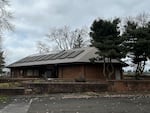With homelessness a declared emergency, city of Vancouver officials have been working behind the scenes to build a large, new homeless shelter. Mostly, they’ve kept quiet about any progress.
But a recent proposal in Olympia has revealed one place where city officials hoped to place it. It’s also revealed the site’s neighbors — Clark College — are not on board.

An empty building pictured on a piece of property near Clark College on Feb. 12, 2024. City officials hope to turn the property — though not necessarily the building — into a homeless shelter.
Troy Brynelson / OPB
In early February, State Rep. Paul Harris, R-Vancouver, revealed that the city has been aiming to build its approximately 150-bed shelter at the edge of the college’s campus. Harris was discussing one of his bill proposals, which would have empowered Vancouver to pluck the land at its own discretion.
“It might not even be visible from the college,” Harris told fellow lawmakers at the committee hearing. “If it is, it will be barely visible. This is not something that you’re just going to drive up to the college and see a huge tent to the left.”
Aaron Lande, a city policy manager, said that the property is a strip of land running between a softball field and the northbound I-5 off-ramp at Fourth Plain Boulevard. The property is mostly behind a chain link fence and currently home to an old government outbuilding.
Harris’s bill went dormant Feb. 1. Had it advanced, it would have allowed cities with at least 150,000 residents and a declared homeless emergency to place homeless shelters on unused state land.
Lande said the city asked Harris in the fall to introduce the bill. Harris acknowledged at the committee that the bill is made-to-fit for Vancouver.
“It might be a little self-serving,” Harris told the committee. “Sometimes we do those things.”
City officials haven’t detailed much about the proposed shelter, but said in recent months that it would house between 100 and 150 beds and be styled like a dormitory.
Unlike dorm-style shelters of the past, however, Vancouver’s pitch would keep service providers on-hand to help residents’ diverse needs, such as finding housing or getting substance abuse treatment.
“This will give an option for an individual to go somewhere, get treatment and be in a safe environment that is policed by the city,” Harris said.
Representatives with Clark College are not as enthused. Dr. Karen Edwards, the college’s president, said in a recent public hearing that she was unaware the city had been planning to build a shelter near its campus.
“I was not invited to, nor included in any conversations about this,” Edwards told lawmakers at the hearing. “I have one administrative assistant and one executive assistant, so it’s not layers of people that anyone would have to go through to reach me.”
Speaking on the shelter idea specifically, Edwards echoed safety concerns that often arise in neighborhoods where homeless services are planned.
“This does pose real and perceived safety concerns,” Edwards said of the shelter. “This is like a treatment center for drug use and mental health. And whenever a person is in an altered state of mind, the risk of harm to themselves and others increase.”
Edwards was supported in her statements by Kevin Brockbank, president of Spokane Community College. Three people supported the bill, however, including Jamie Spinelli, who is spearheading Vancouver’s plans regarding homelessness.
Lande, the city policy manager, said in an interview that the property isn’t the only one on the city’s radar. He was, however, optimistic that Harris’ bill would gain momentum.
“One of the biggest challenges is finding a place to put this stuff,” Lande said. “We have used every city property.”
Lande said that the city wasn’t necessarily targeting Clark College’s property, but hoped that the bill’s passage would offer up more state-owned properties for the city to use.
“It was more like, ‘Hey state, you agree that this is a crisis. What are you doing to help governments to address this on the ground?’”
While dorm-style shelters have been popular for decades, they became less popular as cities tested other approaches. Vancouver and Portland’s tiny home-style outposts are one example of alternatives, as are secured sites where people can sleep in tents or in cars.
City Manager Eric Holmes said in November that by reintroducing a dorm-style shelter, the city could enact stricter camping laws that limit where unhoused people can publicly camp.